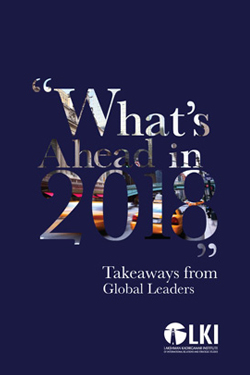From President Trump’s new agenda and Brexit, to new directions in global economic growth, and the pushback on human rights and crises of climate change, LKI’s latest collection of takeaways - What’s Ahead in 2018 - offers a wealth of insights from global thought leaders on the changing dynamics of the world order.
This collection of “takeaways” aims to inform its readers in two ways. First, it aims to convey the perspectives of global thought leaders on the changing dynamics of the world order, to help readers better understand these dynamics. Second, this collection of takeaways suggests ways in which national and foreign policy can be reoriented to face the challenges of these new global dynamics, while achieving enduring policy goals — including those of peace, justice, prosperity and sustainability. This collection of takeaways, therefore, also aims to convey possible pathways for policymakers, especially in Sri Lanka, on how to tackle (i) geopolitical, (ii) economic, and (iii) normative issues of the changing world order.

Reading Time: 2 min read
This collection is accordingly divided into three parts which, respectively, address these three different contexts of change. The first part, on “A Changing Geopolitical Order,” includes summaries of insights by leading experts in Asia, Europe and North America. It illuminates four contemporary aspects of international affairs that are relevant for Sri Lanka: post-Brexit Europe and the international order; the Trump Presidency; the future of the Commonwealth; and the crisis among members of the Gulf Cooperation Council. The views of the global experts that spoke at LKI on these topics were largely in agreement; that multilateral agreements and alliances will prove more difficult in view of the current geopolitical changes, but that stability can still be achieved by not abandoning these multilateral arrangements entirely, by developing smaller ‘minilateral’ and bilateral agreements, and by investing deeply in women and youth.
The second part of this collection, on the “New Dynamics of Economic Growth,” summarises the perspectives of regional experts from Sri Lanka, India and Australia. It presents an outlook for world trade growth, and then details economic trends in the region, from the growth trajectories of China and India, to the Belt and Road Initiative in Sri Lanka, and Sri Lanka-India economic relations. It also covers prospects for BIMSTEC as a regional organisation, and what to expect in East Asian trade, and Asian economic integration. A common theme of this second part is that in 2018 and beyond, China and India will be increasingly important to Sri Lanka’s development, and that understanding the dynamics of these markets and the thinking of their national governments will be crucial to Sri Lanka’s success.
I am impressed with LKI‘s effort to structure and break down the speeches and presentations of the excellent speakers that the institute hosted over the course of the last year. The publication gives very insightful lessons for some of the most pressing issues that the global community is facing. It is an honor for Konrad Adenauer Stiftung to see that its Chairman, Prof. Norbert Lammert, is featured in this publication amongst other outstanding thinkers.
– Christian Echle,
Konrad Adenauer Foundation
The third and final part of this collection encapsulates expert views on “Evolving Norms and Institutions” around the globe, including on: the future of liberal democracy; climate change and sustainable development; economic, social and cultural rights; transitional justice; and trends in resolving maritime disputes. Each of these topics is key to Sri Lanka’s national agenda, given its democratic heritage and system, its natural resources, ongoing process of constitutional reform, post-conflict issues, and ambitions to be a hub of the Indian Ocean. The government of Sri Lanka has prioritised the development of good governance at a national level, and of a rules-based order at a regional level. This third and final part summarises insights as to how these priorities on governance can be implemented, despite evident and continuing hurdles, so that Sri Lanka can progress with transparency, meritocracy, and with strong institutions to facilitate fair national and regional orders.
The year 2018 will be the first full year of Sri Lanka’s journey to achieving its “Vision 2025” — to become a vibrant centre of the Indian Ocean, which must progress as a region of stability and sustainable development. We are grateful to the many leaders and experts who have spoken at LKI, and shared their extensive experience and innovative ideas towards these national and regional objectives, which we hope we have valuably summarised in this collection.